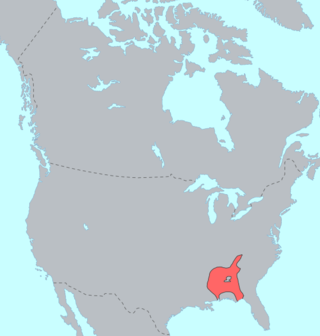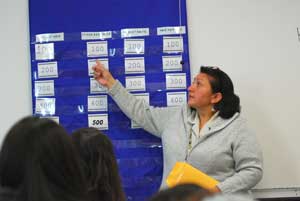Уичита (язык)
| Уичита | |
|---|---|
 Распространение индейских языков в Оклахоме | |
| Страны | США |
| Регионы | западно-центральная Оклахома |
| Общее число говорящих | 0 |
| Статус | исчез |
| Вымер | август 2016 |
| Классификация | |
| Категория | Языки Северной Америки |
| |
| Письменность | бесписьменный |
| Языковые коды | |
| ISO 639-1 | — |
| ISO 639-2 | nai |
| ISO 639-3 | wic |
| WALS | wic |
| Atlas of the World’s Languages in Danger | 893 |
| Ethnologue | wic |
| ELCat | 1003 |
| IETF | wic |
| Glottolog | wich1260 |
Уичита (Wichita) — исчезающий язык каддоанской семьи, на котором ранее говорило племя уичита в городе Анадарко округа Каддо, на западе центральной части штата Оклахома в США. К этому языку относились диалекты уэйко и тавакони. Перепись населения США 1990 г. зарегистрировала 38 носителей языка уичита. К 1999 году из них оставалось менее 30 человек. Последней носительницей являлась Дорис МакЛемор (16 апреля 1927 — 30 августа 2016), умершая 30-го августа 2016 года. МакЛемор была метиской, её отец был белым, а мать была представительницей народа уичита. Языку Дорис МакЛемор научилась от чистокровных уичита — родителей своей матери, которые её воспитывали. В настоящее время есть ещё несколько людей понимающих язык уичита, но народ говорит на английском языке.
Ссылки
- Wichita Language Documentation Project (недоступная ссылка)
- Ethnologue: Wichita
- Exploration of the Red River of Louisiana, in the year 1852 / by Randolph B. Marcy; assisted by George B. McClellan. hosted by the Portal to Texas History. See Appendix H, which compares the English, Comanche, and Wichita languages.
Литература
- Curtis, Edward. (1907—1930). The North American Indian (pp. 230—237). Cambridge. (20 volumes; reprinted 1970).
- Garvin, Paul. (1950). Wichita I: Phonemics. International Journal of American Linguistics, 16, 179—184.
- Marcy. (1853). (pp. 307—308).
- Rood, David S. (1971). Agent and object in Wichita. Lingua, 28, 100—107.
- Rood, David S. (1971). Wichita: An unusual phonology system. Colorado Research in Linguistiscs, 1, R1-R24. (?)
- Rood, David S. (1973). Aspects of subordination in Lakhota and Wichita. CLSs, 71-88.
- Rood, David S. (1975). Implications of Wichita phonology. Language, 51, 315—337.
- Rood, David S. (1975). Wichita verb structure: Inflectional categories. In Crawford (Ed.), (pp. 121—134).
- Rood, David S. (1976). Wichita grammar. New York: Garland.
- Rood, David S. (1977). Wichita texts. International Journal of American Linguistics-NATS 2.1, 91-128.
- Rood, David S.; & Taylor, Allan. (1996). Sketch of Wichita, a Caddoan language. In HNAI (Vol. 17, pp. 580—608).
- Rood, David S. (1998). 'To be' in Wichita. In Hinton & Munro (Eds.), (pp. 190—196).
- Schmitt. (1950).
- Schmitt, Karl; & Schmitt, Iva Osanai. (1952). Wichita kinship past and present. Norman, OK: U. Book Exchange.
- Schoolcraft, Henry. (1851—1857). Historical and statistical information respecting the history, condition, and prospects of the Indian tribes of the US. Philadelphia: Lippincott, Grambo.
- Schoolcraft, Henry. (1953). (pp. 709—711).
- Spier, Leslie. (1924). Wichita and Caddo relationship terms. American Anthropologist, 26, 258—263.
- Vincent, Nigel. (1978). A note on natural classes and the Wichita consonant system. International Journal of American Linguistics, 44, 230—232.
- Whipple. (1856). Reports of explorations and surveys to ascertain the most practicable and economic route for a railroad from the Mississippi River to the Pacific Ocean (pp. 65-68). Washington: War Department. [information on the Waco dialect].







